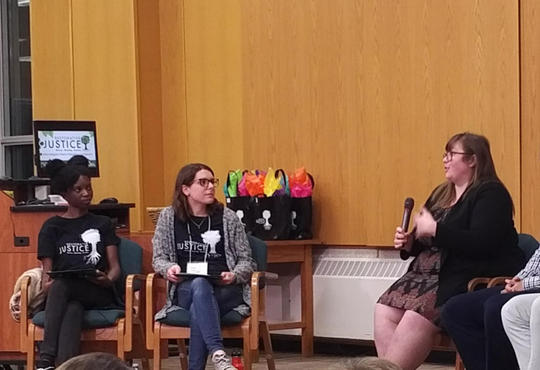In 2015, the Truth and Reconciliation Commission of Canada (TRC) released a final report on Canada’s residential school system, documenting the history of the schools, and the lived experience of survivors--a product of over 6,000 witness accounts. The report included 94 Calls to Action, several of which identified the need to include and prioritize Indigenous history, language, and culture in education.
On March 9, over 30 faculty, adjunct instructors, staff, and students gathered to discuss Indigenization and Decolonization at Grebel – part of Grebel’s ongoing efforts to respond to these calls.
While decolonizing the classroom is no small feat, Grebel faculty members are re-evaluating their course content, actively seeking out new resources, and exploring new ways of teaching in order to incite necessary change. “We have an obligation to do our work, mindful that we are on the land which traditionally belongs to those who lived here before us and still live here among us,” said Marlene Epp, Dean of the College.
For Jeremy Bergen, Associate Professor of Religious Studies and Theological Studies, and Director of Theological Studies, the reformation process begins with taking a critical look at instructional materials. “For my own teaching I try to bring in a wider range of voices,” he said. Jeremy aims to reduce the number of pages of course reading written by white males.
For others, a shift in pedagogy is in order. Jennifer Ball, Assistant Professor of Peace and Conflict Studies (PACS), chooses to teach some of her courses in Circle, a framework that draws on Indigenous practice and knowledge. “It is a way to call myself into a different relationship with my students and with my role as an instructor,” she said. “It prioritizes a relationship between students and the instructor.”
The College is also offering courses that respond to the TRC calls for education on Indigenous issues. In fall 2017, adjunct MPACS instructor Chris Hiller offered “Indigenous- Settler Conflict and Peacebuilding in Canada.” This past winter term, adjunct PACS instructor Narendran Kumarakulasingam taught a course called “Formations of Settler Colonial Violence.” In spring, Theological Studies will follow suit, with a new offering called “Indigenous Theologies and Methods” led by Terry LeBlanc. Other courses that touch on Indigenous topics include “Aging and Spiritual Life,” which offers multi-faith perspectives, including Indigenous, and “Violence of the Bible,” which explores the Biblical justification of violent historical events, including the residential school system.
In the aftermath of the verdicts in the Colton Boushie and Tina Fontaine cases, PACS professor Reina Neufeldt, Narendran Kumarakulasingam, and other UW faculty, organized a ‘learn-in’ event called “unsettling conversations.” Instructors across campus opened their classrooms to provide a forum for discussion about the events to “initiate a culture of robust, respectful and uncomfortable conversation around Indigenous-settler relations among non-Indigenous peoples.” At least three Grebel classes participated and Reina gave a talk in the Arts Hagey Hub.
In response to an increasing demand for Indigenous resources, Archivist-Librarian Laureen Harder-Gissing is working on decolonizing the archives. This includes looking closely at the language used to caption photos, and creating a bibliography of resources on Indigenous content in the library.
The University of Waterloo is also actively planning for change. “As educators, Universities have a role to play to ensure that racism and discrimination no longer have a place in our society,” said Waterloo president Feridun Hamdullahpur in a statement this February. “We can and should ensure that we support an environment [that] provides fair and equitable experiences for Indigenous people through the language we use and the policies and strategic priorities we choose to adopt.” Grebel faculty and students are involved in working groups at the University focused on the following areas: curriculum and academic programming, research, student experience, community engagement, and policy and procedures.






